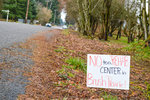


BRUSH PRAIRIE - Along a stretch of SR-503 in Brush Prairie, a large, nearly forgotten building with dark windows and unkempt landscaping has become a bone of contention between a Washington nonprofit and some wary local property owners.
Currently empty, the building sits on a 7.5-acre rectangle of land dominated by a parking lot and dotted with young trees. A chain-link fence surrounds the property and large signs indicate it is currently for sale. In the southwest corner, what was once a small pond is now an empty pit lined with discolored grass.
The structure was originally built as the Bethesda Slavic Church starting in 2006. It caused a moderate controversy for neighbors at the time; traffic and water concerns drove some residents to oppose the church’s construction. Those tensions eventually faded when the institution closed amid financial problems a few years after opening. The building has remained empty ever since.
And some Brush Prairie residents were glad to forget it until news broke late last year that Daybreak Youth Services had moved to purchase the facility and planned to convert it into a substance abuse treatment facility for teenagers. The new facility would employ about 60 people over three shifts and would house and provide drug and alcohol abuse treatment for up to 20 boys and 20 girls aged 12-18.
The plans have awakened old tensions and inspired new fears for some members of the small community, prompting a few vocal residents to push back against Daybreak’s aims. As a result, Daybreak personnel have met with community members in a public meeting and have posted information about the proposed expansion on the organization's website atwww.daybreakyouthservices.org.
“Among the things we’re trying to do is understand community concerns and address them,” said Steve Becker, director of development for Daybreak Youth Services during a phone interview last Wednesday. “Our goal is to be a good neighbor.”
For example, Becker said, the organization is talking with an architect to move the entrance to the facility's parking lot in response to a complaint from a neighbor bothered by the headlights of vehicles leaving the lot.
But some Brush Prairie residents remain unsatisfied. Some complained they were not notified of the organization's intentions until officials realized the facility would need a zoning change to operate as planned.
As regulations stand, the nonprofit could open the facility but would be limited to 10 beds. In order to expand that number to the planned 40 beds, they will need to obtain a conditional use permit from the county. A hearing over the permit is scheduled for March 24. In the meantime, the organization is operating under an emergency ordinance passed by the Board of County Councilors in November.
In a letter to County Councilor David Madore, Clark County Community Services Director Vanessa Gaston expressed support for the facility and said that a current lack of available treatment “is at a point of crisis.”
“There are only 58 treatment beds across the State to treat adolescents and of those total, adolescent females only have access to 16 beds,” Gaston wrote. “This lack of capacity constitutes an emergency for all families seeking treatment for their children during a time when getting help may be necessary to save their child’s life.”
Daybreak operates a similar 16-bed facility for boys in Vancouver and a 40-bed facility in Spokane, accounting for about 40 percent of the total treatment capacity for the entire state, Becker said. With a current estimate of more than 11,000 adolescents between the ages of 12 and 18 who qualify for treatment across the state, the addition of 40 new beds could be a first step toward alleviating a “tremendous lack of treatment capacity.”
Brush Prairie resident Janelle Webb disagreed with officials casting the situation as an emergency.
“That's not an emergency,” she said in an interview last Wednesday. “There's always been kids on drugs and there will always be kids on drugs. That's not a reason to push through a zoning change without notifying the community.”
A petition against the nonprofit's plans has collected about 200 signatures, Webb said as she and other residents raised questions about what effect the facility may have on the face of the neighborhood. Despite the opposition, she said, the residents supported building the facility elsewhere.
"It's not that we don't want youth to get help,” Webb said. “We've all known people who struggle with addictions. But we don't want it in our neighborhood where it's not zoned for it. It's going to cause all of our property values to plummet.”
Fellow Brush Prairie resident Kailyn Hall echoed Webb's concerns and accused Daybreak staff of refusing to return phone calls or answer questions about the specifics of the nonprofit's plans.
“By the time they informed us it was already so far into their process that … now whatever we say makes us look like the bad guys who don't care about helping the kids,” she said.
Hall, who said she grew up in Northeast Portland, moved to Brush Prairie shortly before news of the planned facility went public. She said her case highlights the harm that will be done to families if the facility is allowed to proceed because her family moved to the rural area specifically to avoid drug and alcohol issues.
“Not that you're going to avoid them wherever you go, but it definitely changes how accessible issues can be,” she said. "We chose this place because we felt like it would be away from the concerns we would have in the city … We made the investment in these properties to be away from the more urban setting and the more - this type of facility."
Long-time resident Daphne Haworth expressed concern for the safety of area children and worried the facility may attract people involved in the drug trade. The students' visiting family members may also have drug problems, she said.
“Those drug addict parents are going to be coming up and down my street,” Haworth said. “Or they'll be using the public transportation which means they will be getting off of a bus and walking through our property to get over here.”
"They're going to take them on field trips in a bus to areas in the community to do things and see how to help people,” she added, referring to community service projects like litter clean-up events or programs that help elderly residents with chores. “I don't want them coming around my house … Do we want them in our yards? Do we want them coming and seeing what we have and what we might not have? This is a problem."
Councilor Madore rejected the idea that the facility would make the neighborhood less safe.
“Those young people who have addiction problems are already in our community,” he said. “And they don't have help. They can't choose help.”
Becker too dismissed safety concerns. The organization's clients are often referred by teachers, clergy, or parents, he said, as opposed to law enforcement as is commonly believed. When kids do get referred through law enforcement agencies, it is often for the crime of possession in the first place.
“It's against the law for kids to be in possession of (drugs and alcohol),” he said, “So sometimes they come to the attention of law enforcement and sometimes they are told they need treatment.”
Contrary to some misconceptions, the organization doesn't accept court-ordered rehab clients. For security, the facility will be locked and fenced off and uses safety glass windows. The organization does not accept students who may pose a threat to staff or other clients.
“We're just not equipped for that,” Becker said.
In response to concerns about children and crime, Becker pointed out that the nonprofit's Vancouver facility sits next to an elementary school and the planned facility near SR-503 is about half of a mile from the Clark County Sheriff's Northwest Precinct Office.
“This location and this facility are ideal,” he said.
The Greater Brush Prairie Neighborhood Association plans to discuss the issue during a meeting at 4 p.m. Sat., Jan. 30, at the Hockinson Fire Station, 17718 NE 159th St. in Brush Prairie.